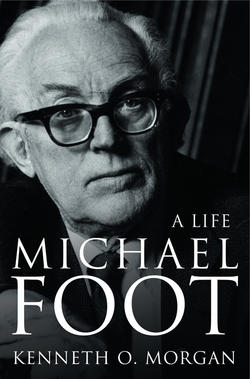Michael Foot: A Life

Реклама. ООО «ЛитРес», ИНН: 7719571260.
Оглавление
Kenneth O. Morgan. Michael Foot: A Life
Kenneth O. Morgan. MICHAEL FOOT
DEDICATION
CONTENTS
PREFACE
1 NONCONFORMIST PATRICIAN (1913–1934)
2 CRIPPS TO BEAVERBROOK (1934–1940)
3 PURSUING GUILTY MEN (1940–1945)
4 LOYAL OPPOSITIONIST (1945–1951)
5 BEVANITE AND TRIBUNITE (1951–1960)
6 CLASSIC AND ROMANTIC
7 TOWARDS THE MAINSTREAM (1960–1968)
8 UNION MAN (1968–1974)
9 SOCIAL CONTRACT (1974–1976)
10 HOUSE AND PARTY LEADER (1976–1980)
11 TWO KINDS OF SOCIALISM (1980–1983)
12 INTO THE NINETIES
ENVOI: TOUJOURS L’AUDACE
SELECT BIBLIOGRAPHY
INDEX
ABOUT THE AUTHOR
NOTES. Chapter 1: NONCONFORMIST PATRICIAN (1913–1934)
Chapter 2: CRIPPS TO BEAVERBROOK (1934–1940)
Chapter 3: PURSUING GUILTY MEN (1940–1945)
Chapter 4: LOYA OPPOSITIONIST (1945–1951)
Chapter 5: BEVANITE AND TRIBUNITE (1951–1960)
Chapter 6: CLASSIC AND ROMANTIC
Chapter 7: TOWARDS THE MAINSTREAM (1960–1968)
Chapter 8: UNION MAN (1968–1974)
Chapter 9: SOCIAL CONTRACT (1974–1976)
Chapter 10: HOUSE AND PARTY LEADER (1976–1980)
Chapter 11: TWO KINDS OF SOCIALISM (1980–1983)
Chapter 12: INTO THE NINETIES
Envoi: Toujours L’Audace
PRAISE
BY THE SAME AUTHOR
COPYRIGHT
ABOUT THE PUBLISHER
Отрывок из книги
A LIFE
TITLE PAGE
.....
During the First World War the Foots moved to Ramsland House in St Cleers, on the edge of the Cornish moors. But Michael always identified intensely with Plymouth, the city which was his boyhood home, where his father was Lord Mayor and where he fell in love with Jill. And to a degree Plymouth identified with him, indeed with all the Foots. David Owen, a future Cabinet colleague and Member for Devonport, grew up there in the fifties under the shadow of the Foots as a dominating dynasty. In the 1970s Michael and Jill, somewhat remarkably, managed to persuade the local authority in Hampstead to rename their road Pilgrims Lane, in tribute to his native city’s most famous exports, and the nickname also of its football team. In later life he would recall happy episodes from his childhood, such as visits to the Palace Theatre. One such recollection became memorable, when in a Commons debate in October 1980 during Labour’s leadership election he spoke of a conjuror who smashed with a hammer a gold watch belonging to a member of the audience, but then forgot the rest of the trick. But it remains open to conjecture how far this was a real Plymouth, or rather an affectionate amalgam of fact, legend and folk memory, specific and selective associations from the Armada to the Blitz, ready for instant political mobilization in argument. Michael Foot’s historical reading and personal background formed a highly usable background. This was true of all his interpretations of past scions of the liberty tree, from the Levellers to the suffragettes, and it applied equally to his vision of a post-modernist Plymouth.
That does not mean, of course, that his childhood memories were necessarily entirely benign. Michael’s schooling was delayed by his severe asthma in 1919, which led him to go to London at the age of six to obtain medical advice. Indeed, his awareness of ill-health and fear of being thought unattractive were important threads in his early years: a robust life into his nineties was not what the doctors might have predicted. His first school in 1919 was a local preparatory school, Plymouth College for Girls, perhaps not a total success for a six-year-old boy. In Recitation, his school report commented, ‘His expression is very good; he should speak out more’ – seldom an injunction needed in later life. Another subject was Needlework – ‘Good, but he works too slowly.’21 In 1921 he went on to Plymouth College and Mannamead School. Going there was not without its hazards, especially being harassed by local bullies as he made his way across Freedom Fields. In 1923, at the age of ten, he went away to a private boarding school, Forres, in Swanage on the Dorset coast. His brother John was already a pupil there. Michael’s progress was often interrupted by bronchial complaints; nor did the school’s occasional penchant for caning its pupils (including Michael himself for one alleged misdemeanour) appeal to him. But he seems to have developed well, and his headmaster, R. M. Chadwick, wrote enthusiastically when he left Forres in 1927 of the immense contribution he had made, and how his name should be inscribed on the school Honours Board. He was first in his form in every subject from Latin to Scripture, while he had also done well in sport as captain of games – ‘a very good example of all-round keenness’. An earlier report at Christmas 1926 had commended his football skills – ‘Fast and a very good shot at goal. Much more determined than he was last season.’ The headmaster added in his final remarks, ‘We have all grown very fond of him during his time with us and he will leave a big gap. We look forward to making Christopher’s acquaintance next term.’22
.....